This November saw the Institution's Southern Asia Region host “Engineering Tomorrow”: an Asia-Oceania event for the young members of the constituting regions, which was combined with the Asia Pacific Speak out for Engineering (SOFE) finals held in Colombo, Sri Lanka. The participating nations were China, Hong Kong, Thailand, Malaysia, Singapore, Australia, New Zealand, Pakistan, India, UK and Sri Lanka.
The event was supported by the UK Young Member Board and also included an Annual Dinner, Young Member Conference and Learned Society talks.
The Engineering Tomorrow experience started with a visit to the University of Moratuwa. Sam Perera, Lasantha Kurukularachchi and Siddartha Khastgir were in attendance as Monujesh Borooah spoke to students of Mechanical Engineering on the IMechE and the benefits of membership.
The presentation was followed by an extended discussion wherein Siddhartha detailed the competitions, prizes and awards that can be won.
There was keen interest in the students to carry the association with the IMechE forward.
Speak Out for Engineering Competition
The Speak Out For Engineering (SoFE) preliminaries started in the afternoon of 6th November 2014.
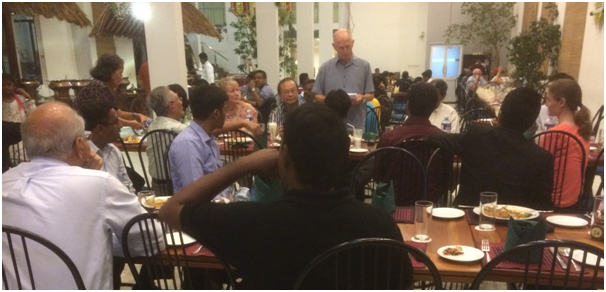
The contenders were from Southern Asia and the Sri Lankan representative went forward into the finals.
The Speak Out For Engineering finals started in the morning of 7th November. Mr. S. T. Perera, Chairman, Southern Asia Region, IMechE welcomed the delegates.
Ms. Caitlin Prior spoke on Additive Manufacturing. She gave the example of an Airbus A320 bracket with 75% reduction in material; of prosthetic and plaster cast replacements and explained Primarily Fused Deposition Modelling.
Mr. John See Jing Leung spoke second about Wearable Technology for Rail Safety. He explained his work in monitoring train and track health through credit-card sized vibration sensors to prevent mechanical failure and save cost.
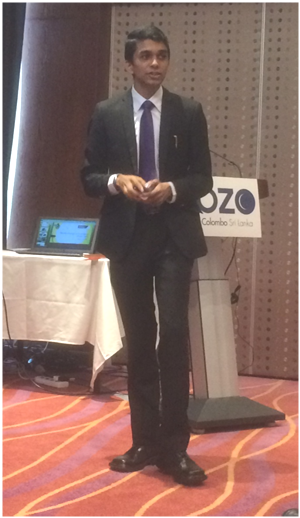
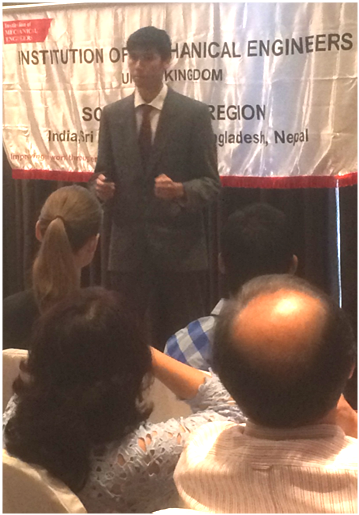
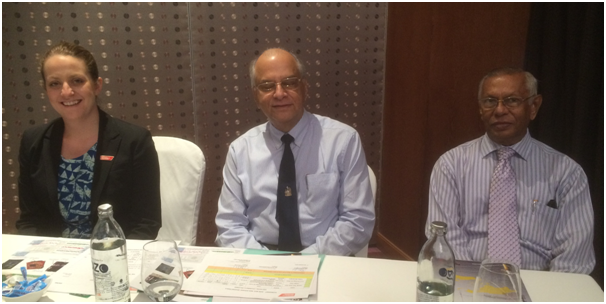
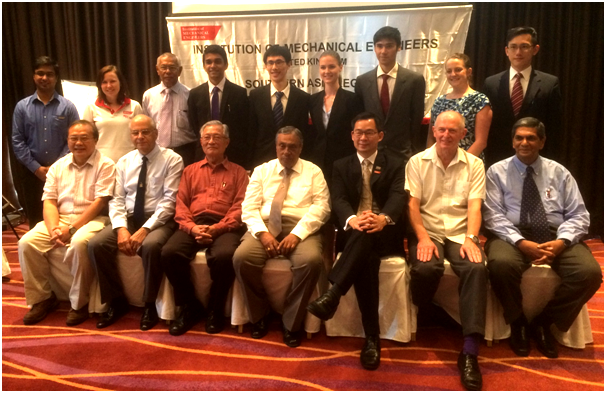
John See Jing Leung went on to win first place and a prize of the equivalent of £300 for his presentations on wearable technology for rail safety, whilst Yohann Ian was the runner up in second place for his presentation on bionic prosthetics, for which he was awarded the prize of the equivalent of £200.
Here you can see videos of each of the finalists explaining the benefits they have found from entering the Asia-Pacific inter-regional Speak Out for Engineering (SoFE) competition:
John See Jing Leung, winner of the Asia-Pacific SoFE final 2014
Yohann Ian, runner up of the Asia-Pacific SoFE final 2014
Caitlin Prior, third-place Asia-Pacific SoFE finalist 2014
A.H.T Eranga de Silva, fourth-place Asia-Pacific SoFE finalist 2014
Ruth Shilston, Chair of the Institution's Young Members Board and one of the judges at the Asia-Pacific SoFE final 2014.
You can read more about the Institution's Speak Out for Engineering Competition on our website.
Annual Dinner
The IMechE Sri Lanka Group's Annual Dinner featured as part of the Engineering Tomorrow event and included a traditional inaugural lamp lighting by all dignitaries, as well as traditional dancing.
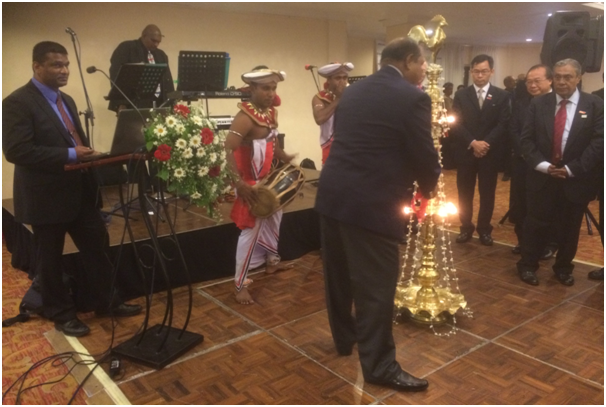
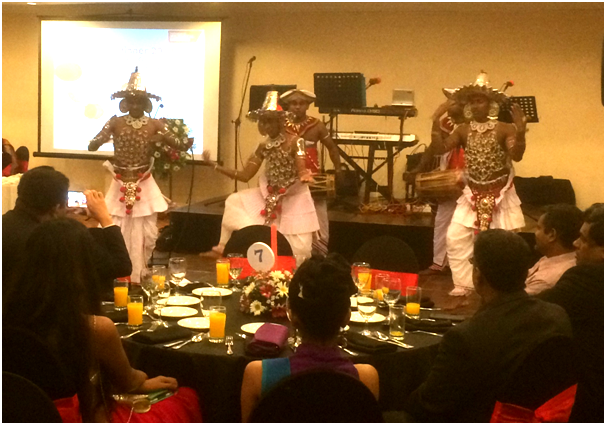
Learned Society Talks
A series of technical seminars and panel discussions were held with international speakers sharing their insights on engineering, exposing our young members in Sri Lanka with the realms of possibilities that engineering has to offer.
Professor Alan Kin-Tak Lau spoke on New Challenges for IMechE towards Aviation Industry.
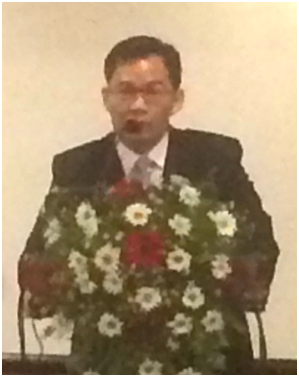
The challenges are in the three segments of manufacturer/supplier, airline industry and airport industry.
Sustainability and recyclability are the way forward and 9% of structural weight in an Airbus A380 is in composites versus only 3% in a Boeing.
Mr. Ken Tushingham spoke on how being an engineer is a 24-hour thing: its a way of life. Its very individual and personal and may lead you to do extraordinary things. All you need is an enquiring mind, an imagination and a trigger!
Mr. Gemunu Silva spoke on Ancient Technology in Sri Lanka. He showed that use of tools started in 125,000BC and that geometric microliths have been uncovered from 28,500BC and that the remains of a large city dating to 9,000BC has been discovered in Anuradhapura.
He also showed evidence of early ‘skyscrapers’ dating to 3rd Century BC.
Mr. T. S. Sangha spoke on Accreditation, Assessment and Routes to Membership. He elaborated on UK SPEC, the three levels of professional registration and academic assessments.
He also detailed the accreditation of higher education programmes and the process that needs to be followed.
Dr. Helen Meese communicated with the audience through video on Engineering in Society: Preparing Our Next Generation.
She spoke on fundamental concepts, basic integrals, engineering innovation and policy statements issued by the IMechE. Her final message was, “The public responds well to technology that is given social relevance. The science and engineering communities need to pay greater attention to the globally shifting needs of society.”
In the panel discussion moderated by Siddhartha Khastgir, Mr. Rankin spoke on the need for diversity – how he relies on his Sri Lankan staff to take decisions. He elaborated further on the diversity of emerging economics and the competition thereof and that, finally, different countries need different solutions and engineers are needed for these solutions.
Mr. T. S. Sangha brought out the fact that 50 years ago, most IMechE members were engineers in the field. Very few were academics. Today, we seem to be losing the practical touch in many ways.
Ms. Ruth Shilston highlighted the incredible opportunity to maximise growth in digital communication – ‘I can do my job from anywhere in the world’. She also stressed the interdisciplinary factor – that mechanical engineers now lead design of buildings, that she is a part of a multidisciplinary team and that the lines are getting blurred.
Mr. Newton Wikramasuriya began with the question: ‘Are we taking the path of outcome based engineering or hands-on engineering?’ He talked about the low awareness of whether an engineer, once qualified, needs to be professionally registered. He called for a rationalised approach to engineering.
Mr. Wikramasuriya brought out the cultural factor: that due to prevalent system of education and society, bright students are pushed into engineering without aptitude tests.
Young Member Conference
The engineering community and thinkers around the world has acknowledged the fact that the society will be taken forward by our young engineers, thinkers and entrepreneurs. It is paramount responsibility of the established and experienced engineers to guide the young generation towards releasing their potential and engage them more proactively.
The young member conference encouraged student members of IMechE from Sri Lanka and young members for the Asia Oceania region to have an interaction and to share their expectations about what the IMechE should offer. The conference focused on creating a pilot scheme to increase young member activities internationally. The basic aim of the young member conference was to encourage students to pursue an engineering career and improve the world through engineering.
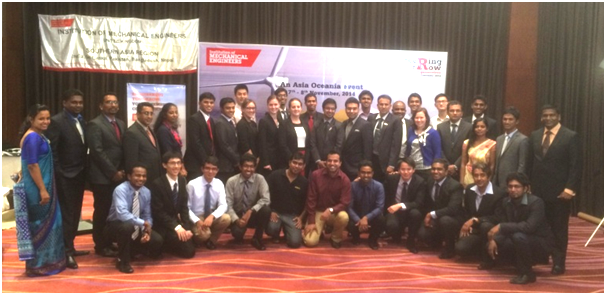
To read more about the events and activities of the four Asia-Pacific regions, you can visit the NearYou sites of the Institution's
Southern Asia Region,
North East Asia Region,
South East Asia Region and
Oceania Region.